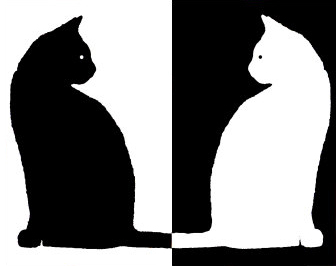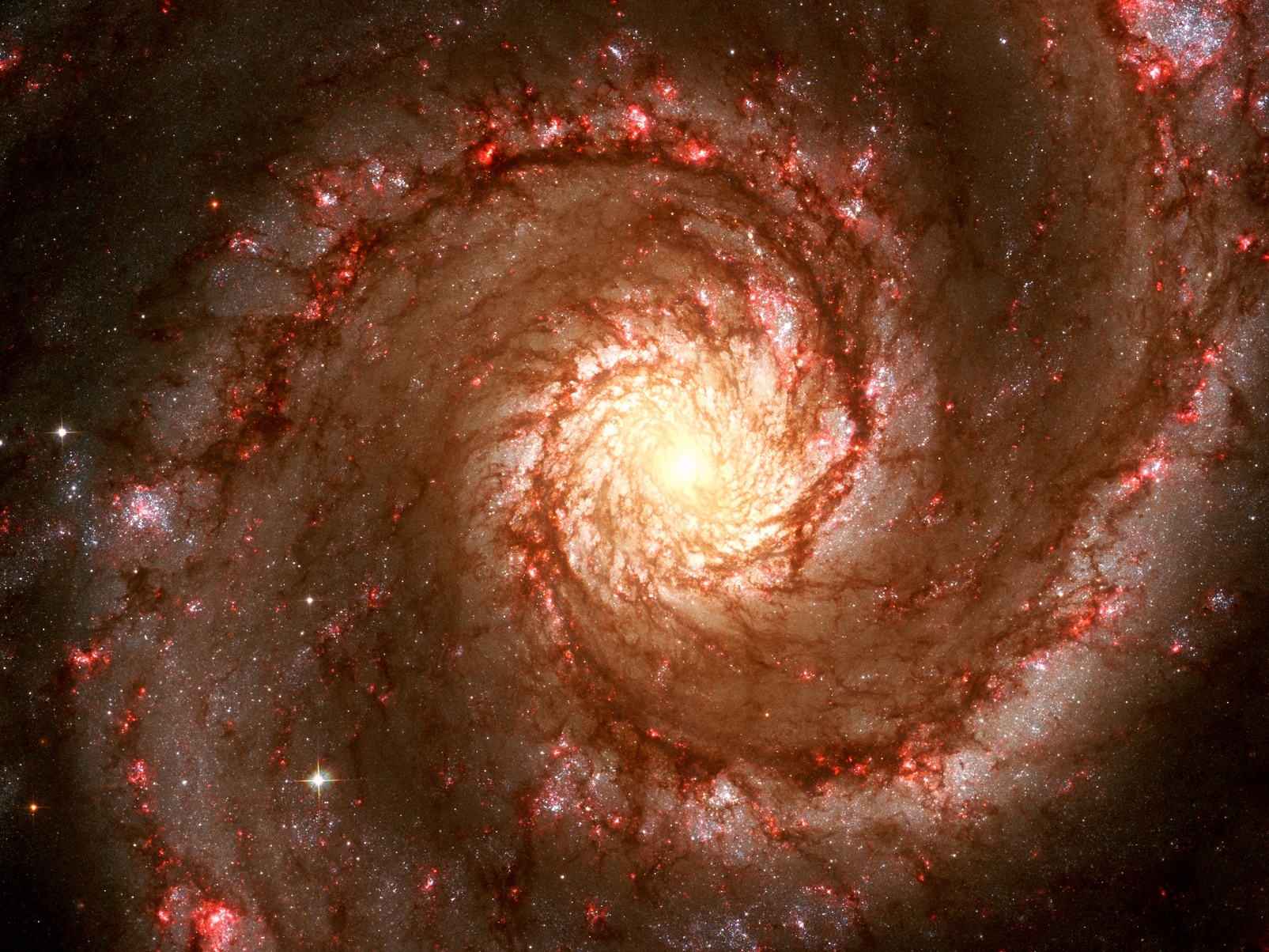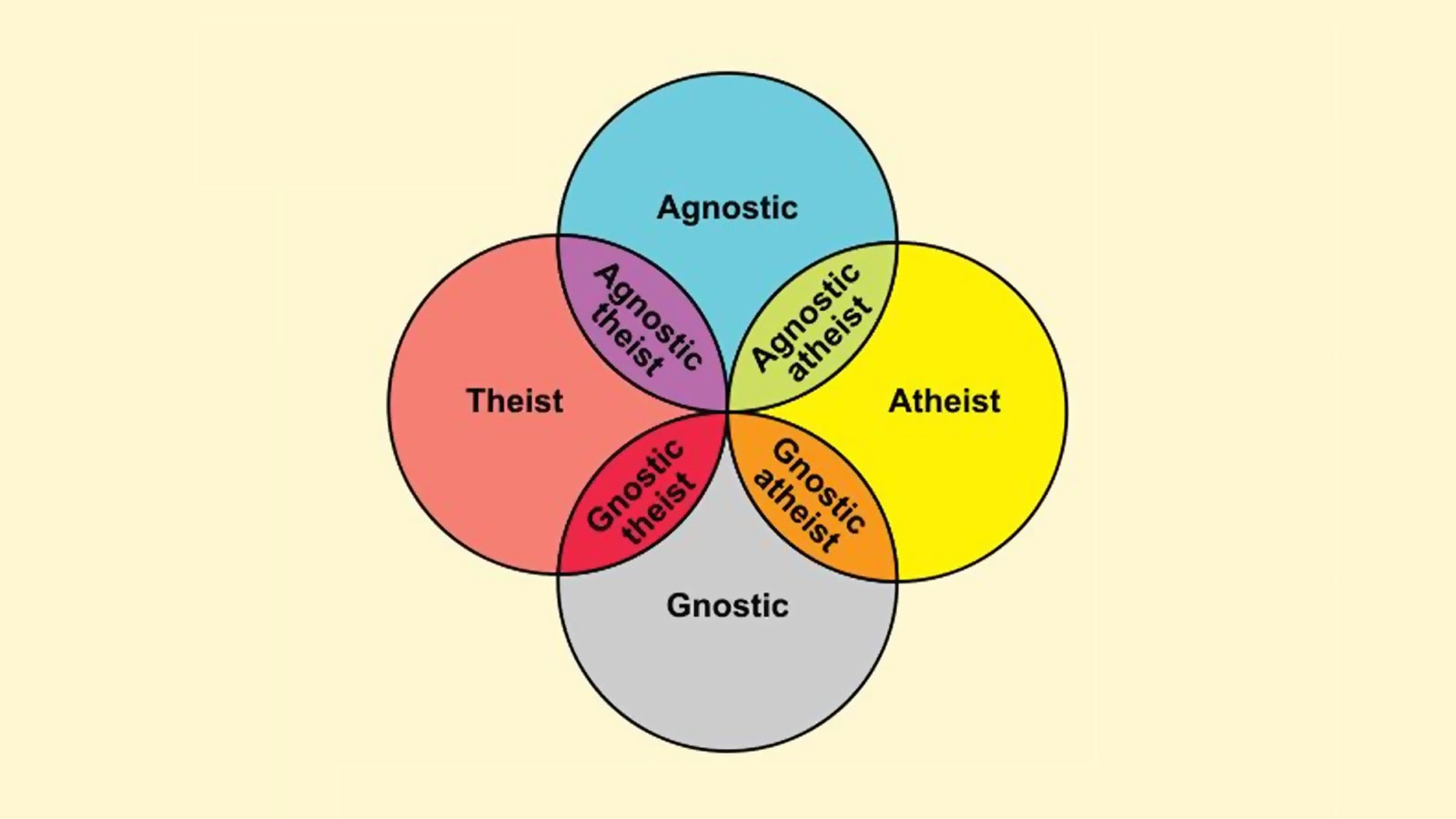Do you consider yourself an agnostic, freethinker, or atheist?
Do you consider yourself an agnostic, freethinker, or atheist? If so, please let me know. And if don't want to out yourself to your friends and family, then feel free to send me a private message.
Godless Heathens That Go Around Getting Hitched
I have a serious question for anyone that is against gay marriage for religious reasons: Why aren't you trying to suppress atheists from getting married? After all, there are millions of gay people that actually believe in God (even the same one as you), but ...
Q: How do you explain life?
Q: Atheists: How do you explain life?
I'm one of those rare breeds who believe equally in God and in Science... I evidently see evolution, and I can even go along with the Big Bang Theory, but how do you explain what makes us alive? Or ...
Q: Why do things need to be black and white?
Q: Why do things need to be black and white?
I'm talking about logic & religion.
The religious and faithful have been called delusional, and the non-religious have been called logical. Why can't a person be smart, logical, and also have a belief in God? I do.
One ...
Agnostic Atheism
Agnosticism is often thought of as scientific because it appears open to new ideas. It implies that there is a possibility that evidence might exist that would prove that deities are real; we just haven't found that information yet and we may never find it. ...
Q: Science does not have any morals, yet Atheists still worship science?
Q: Science does not have any morals, yet Atheist still worship science?
It seems futile and I don't understand. Why do you choose hell over the kingdom of God?
A: Science does not have any morals because science is not a religion. Mathematics and chemistry have no ...
Q: What’s with all of this animosity between Christians and atheists lately?
Q: What's with all of this animosity between Christians and atheists lately?
A: Lately? This crap has been going on for (literally) thousands of years. It just wasn't until the invention of the internet that we finally got to see the theism debate argued across the ...
Why I Am Atheist
We are all born atheist. Once I hit my teenage years I became as devout of a Christian as I could possibly be. I went to church, prayed, and all the usual stuff. When I was in 10th grade I met a guy that had ...
Q: If you could ask God any question, what would it be? and what would be the question that God asks in response?
Q: If you could ask God any question, what would it be? and what would be the question that God asks in response?
A: Eric: Why are you so explicit in the Bible but so silent in nature?
God: How would I get people to read my ...
Q: Atheists: Could you argue IN FAVOR of Theism?
Q: Atheists: Could you argue IN FAVOR of Theism?
This is more a poll about debate skills than principles. I know from my own debate experience that I rely on the rules of logic to form a sound argument. I also think that I can argue ...
Q: Why do some Christians tell atheists that they aren’t going to heaven?
Q: Why do some Christians tell atheists that they aren't going to heaven?
Do they think that bothers us? We don't believe there's a heaven and we don't think Christians themselves are going to any place like that either. So why do they say this to ...
Q: This question was asked yesterday. Would the religious do the same for atheist?
Q: This question was asked yesterday. Would the religious do the same for atheist?
Atheists, If religion was outlawed would you fight for freedom of religion?
Freedom of religion is considered a fundamental civil right, if it was to be prohibited (like it was under the Stalin ...
Christian Beliefs vs. Atheist Beliefs
Gods that Christians don't believe in:
Gods that atheists don't believe in:
AesirAgasayaAgdistisAh chuy kakAh cun canAh hulnebAh puchAhulaneAhura mazdaAineAirmidAizen-myooAji-suki-taka-hi-koneAkeaAlberichAma-no-minaka-nushiAma-tsu-maraAmaethonAmaterasuAmatsuAmatsu-kamiAme-no-mi-kumariAme-no-wakahikoAmidaam-no-tanabata-himeAnAnahitaAnatAnathAndhrimnirAndrasteAndvariAngrbodaAngus ogAnktAnnapurnaAnoukeAnsharAnuAphroditeApolloApsuApukohaiArawnArayAresArianrhodArtemisArtioAsclepiusAsherahAshurAstarteAstrildAthenaAthiratAthtartAtlaAtlasAudhumlaBa'al hadadBaalBaal-hammonBaalatBabd cathaBacchusBadbBakuBalderBalorBalramaBastBa xianBeg-tseBelBelatu-cadrosBellonaBelobogBentenBenzai-tenBergelmirBerstukBesBeylaBhuvaneshwariBimbogamiBinzuru-sonjaBishamonBixia yuanjinBlodeuweddBorghildBosatsuBragiBrahmaBranBranwenBrighidBrigitBrisBronoBuddhaBugid y aibaBuluc chabtanBurijasButsuBylgiaCamalusCamaxtliCamulusCariocienusCaswallawnCeresCeridwenCernunnosCerridwenCerunnosChacChalchiuhtlicueCharunChemoshCheng-huangChien-shinChimata-no-kamiChup-kamuiCrnobogCupidCybeleCyhiraethDagdaDagonDagonDagurDaibosatsuDaikokuDainichiDamkinaDanuDavlinDawnDazbogDemeterDevDewiDhanwantariDhumavatiDianaDiancechtDi cangDionysusDisenDonDonarDosojinDozoku-shinDruantiaDurgaDylanDziewonaEaEbisuEirEkchuahEkibiogamiElElaineEl elyonElliEmma-oEnkiEnlilEnyaliusEnyoEosEponaEreskigalErraEsharaEshmunFarbautiFaunusFenrirFlidaisFlinsFloraForsetiFreyaFreyrFriggFudoFujinFukurokujuFunadamaFutsu-nushi-no-kamiGaiaGamaGaneshaGangaGarudaGauriGebGefionGekka-oGeong siGerdGiobhniuGuGuan-diGunGwydionGwynn ap nuddHachimanHadesHadurHaiHaniyasu-hikoHaniyasu-himeHanumanHathorHauliliHaya-jiHeimdallHelHeliosHeng-oHephaestusHeraHermesHermodHestiaHiakaHiiakawawahilaniHinakuluiauHirukoHodHoderiHollerHooriHorsHorusHoso-no-kamiHoteiHsi-wang-muHuitzilopochtliHygeiaIctinikeIda-tenIdunIka-zuchi-no-kamiIki-ryoInannaInariIndraIntiIrminIshtarIsisIsoraIxtabIzanagiIzanakiIzanamiJanusJariloJarovitJinushigamiJizoJordJormungandJuichimenJunoJupiterJurojinJuthrbogJuturnaKagutsuchiKalaipahoaKaliKaluannuunohonionioKamado-gamiKamapua'aKami-kazeKaminariKamohoali'iKamooaliiKanaloaKanayama-hikoKanayama-himeKaneKane-hekiliKapoKapohoikahiolaKarewitKariKartikeyaKarttikeyaKathiratKaupeKawa-no-kamiKenro-ji-jinKeoahikamakauaKeuakepoKhepriKiKihaKinguKinich ahauKisharKishi-bojinKishijotenKishimo-jinKo-no-hanaKojinKoleamokuKorrawiKoshinKotharKoya-no-myoinKrishnaKuKuahanaKukailimokuKukaooKukulcanKukunochi-no-kamiKuni-toko-tachiKura-okamiKurmaKuulaKvasirLaamaomaoLabraidLadaLadoLagaLakaLakakaneLakshmiLaranLaresLibintiaLieLizaLlyrLofnLokiLonoLonomakuaLotanLughLunaMachaMaeveMagna materMagniMahuluMaiaManannanManiManuaMardukMargawseMarisha-tenMarowitMarsMaruMarzannaMatangiMath ap mathownyMatka gabiaMatka ziemiaMauiMawaya-no-kamiMayaMebdMedbMelqartMenhitMenthuMentuMercuryMextliMiderMikaboshiMiluMimingMimirMinervaMiroMithrasMixcoatlMiyazu-himeMoaaliiModiMokoshMokualiiMolochMonju-bosatsuMooaleoMorriganMotMummuMurukanMusubi-no-kamiMyrrdinNaconNai-no-kamiNaka-yama-tsu-miNammuNanajaNannaNanseNeithNemainNemesisNephthysNeptuneNergalNiamhNikko-bosatsuNinazuNinhurzagNinigi-no-mikotoNintuNinurtaNjordNominosukuneNornsNottNutNyoraiOanomochiOdinOgounOhkuninushiOho-yamaOhonamochiOhyamatsumiOkuni-nushiOpsOrgelmirOroOsirisOstaraOuliOwatatsumiOyamatsumiPalesPanPapaParvatiPelePerperunaPersephonePerunPhaethonPhoebePhoebus apolloPilumnusPlutoPodagaPoliahuPomonaPorewitPoseidonProserpinePueaQadeshtuQuetzalcoatlRadegastRaidenRamRamaRanReResefReshepReshephRheaRodRugivietRyo-woSabaziusSae-no-kamiSagaSakhmetSambo-kojinSamulayoSarasvatiSarutahiko ohkamiSaturnSegomoSeleneSengenSeptuSeshatSethSetiShacharShakaShaktiShalimShamashShamayimShapsuShemeshShen yiShichi fujukinShindaShine-tsu-hikoShivaShodenShokiShuSi-wang-muSiebogSifSimarglSinSironaSitaSiwaSjofnSkadiSleipnirSolStribogSuijinSuitenguSukuna-bikoSuryaSusanohSusanowaSvantetitSvarogSvetovidSvetovitSynTakami-musubiTakemikadzuchiTaki-tsu-hikoTatsuta-himeTawaretTefnutTehwomTenjinTeutatesTezcatlipocaThanatosThe zoryaThorTiamatTlalocTonatiuhToyo-uke-bimeToyouke-omikamiTriglavTsuki-yumiTuTu matauengaTurrisTycheTyrUbaUga-jinUga-no-mitamaUkanipoUkemochiUlaulekeahiUliUllUtuUzumeValiValkyriesVamanaVanirVarVelesVenusVertumnusVestaVidarVishnuVolturnusVulcanWakahiru-meWata-tsu-miWepwawetWurukatteXipeXi wang-muXochipilliXochiquetzalYabuneYamYam-naharYama-no-kamiYamatoYarikhYmirYu-huangYuki-onnaYum kimilZababaZanaZedekZeusZirnitraZislbogZiziliaZroya
AesirAgasayaAgdistisAh ...
You Are Not Agnostic
This is an old paper I wrote for a religion class, and I'm only leaving it here for posterity. I may replace it with a more concise version (because this one is too academic) once I feel the motivation. This version does not fully represent ...
Can’t Prove or Disprove It
Saying that you can't prove or disprove the existence of God has been the cop-out for the God debate for as long as I've been aware of it. Atheists, Christians, and primarily agnostics use this idea when it all comes down to agreeing to disagree. ...





